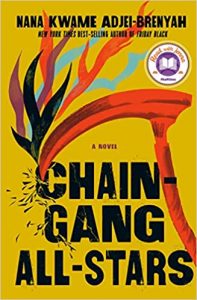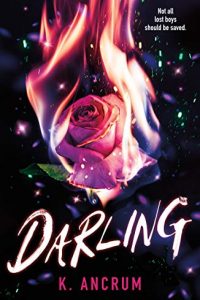Ian Mond Reviews Chain-Gang All-Stars by Nana Kwame Adjei-Brenyah
 Chain-Gang All-Stars, Nana Kwame Adjei-Brenyah (Pantheon 978-0-59331-733-4, $27.00, 384pp, hc) May 2023.
Chain-Gang All-Stars, Nana Kwame Adjei-Brenyah (Pantheon 978-0-59331-733-4, $27.00, 384pp, hc) May 2023.
Dystopian fiction is having a moment. It’s always been a staple of the genre, but since 2016 there has been a surge in near-future dystopias, primarily set in America, imagining our world through a post-Trump lens. While these books have near-universally been compared to The Handmaid’s Tale, work by a diverse range of authors like Jessamine Chan, Megan Giddings, and Marisa Crane continuing the tradition of writers such as Octavia E. Butler in exploring subjects such as race, gender, and motherhood has seen the contemporary dystopia emerge from the shadow cast by Margaret Atwood. Nana Kwame Adjei-Brenyah’s Chain-Gang All-Stars is such a novel. Having burst on the literary scene with his 2019 collection Friday Black, his debut novel matches, even surpasses, the roiling, vibrant energy of his shorter fiction, delivering both an impassioned critique of America’s broken justice system and a heartrending queer love story.
Chain-Gang All-Stars envisions a future where violent, hardened criminals (and sometimes not so violent or hardened) are offered the opportunity to fight for their freedom. Under the Federally endorsed Criminal Action Penal Entertainment program, ‘‘convicted wards of the state’’ can agree to have their sentence commuted if they can survive three years’ worth of death matches against their fellow criminals. Played in front of packed arenas and millions streaming from home, all baying for blood, this modernised bread and circuses fills the coffers of the Prison Industrial Complex. It also makes heroes of the Gladiators, like Sunset Harkless, longtime leader of the Chain-Gang A-Hamm and two of A-Hamm’s ‘‘links’’: the clinical but brutal Loretta Thurwar who, like Sunset, is only weeks away from fulfilling her three-year contract and her lover Hamara ‘‘Hurricane Staxx’’ Stackers, adored for the way she slices up opponents with her double-edged blade, LoveGuile. But whatever peace and joy Thurwar has found in her friendship with Sunset and love for Staxx, it all comes apart when Sunset is murdered by one of the links during the Chain-Gang’s forced marches between venues – a tragedy compounded by Staxx’s confession that she is the killer.
My précis would suggest a linear structure told from a limited number of perspectives, but that’s not the case. Nestled around the Thurwar/Staxx/A-Hamm narrative is a mosaic of stories, some of which dovetail with the main plot. This includes Emily, who initially detests ‘‘Chain-Gang All-Stars’’ but, with the help of her boyfriend Wil, becomes invested in all thirty-three seasons; and Jerry, the driver who transports A-Hamm back to their encampment after each death match; and the researcher, Patricia, who in seeking a ‘‘cure’’ for pain instead invents a device that shreds a person’s nervous system, the perfect tool for keeping the incarcerated under control; and Mari, the daughter of Sunset Harkless, who is conflicted about her father’s criminal past and yet, along with other activists, protests the brutality, the inhumanity of Chain-Gang All-Stars outside each arena. Further enriching Adjei-Brenyah’s world is a peppering of footnotes. Some explain the tech, like the Holo Cameras that live stream the Chain-Gangs when they’re not fighting, while others provide distressing factoids about America’s carceral system, not least of which is the disproportionate incarceration of black men and women, with ‘‘2,272 out of every 100,000 Black men… compared to just 392 out of every 100,000 white men [and] Eighty-eight out of 100,000 Black women… compared to 49 out of every 100,000 white women.’’ All of this, blended with the main story, opens the novel up to a variety of themes ranging from mainstream media’s culpability in normalising injustice to whether true prison reform is possible, especially since neither side of politics (Republican or Democrat) wants to be viewed as weak on crime. But as upsetting as these factoids are, as much as they recognise centuries of systemic racism, for Adjei-Brenyah each footnote is an opportunity to provoke discussion. This is a novel that eschews didacticism and instead provokes discussion.
As I say above, dystopian novels like Chain-Gang All-Stars or Marisa Crane’s brilliant I Keep My Exoskeletons to Myself have emerged from the shadow cast by The Handmaid’s Tale. This is because Atwood’s novel was intended to be a warning – one we clearly ignored – against the militant religious right overturning the successes of first- and second-wave feminism. In contrast, Chain-Gang All-Stars is a critique of the current moment. The legalised blood sports that Adjei-Brenyah depicts are a recognition of a lived reality for those predominantly Black and Brown communities that are required to navigate America’s punitive and flawed justice system. The only difference is that the horror and brutality the incarcerated face today is (mostly) hidden from plain sight. When the activist, Mari, explains to a journalist why she is against CAPE, her arguments resonate because they could be applied to the present-day corporate interests that feast on industrial incarceration: ‘‘The carceral state depends on a dichotomy between innocent and guilty, or good and bad so that they can then define harm on their terms, in the name of justice, and administer it on a massive scale to support a capitalistic, violent, and inherently inequitable system.’’ The true power of Chain-Gang All-Stars is that the dystopia it depicts no longer reads like a fanciful thought experiment but a horrible foreshadowing of the future.
Ian Mond loves to talk about books. For eight years he co-hosted a book podcast, The Writer and the Critic, with Kirstyn McDermott. Recently he has revived his blog, The Hysterical Hamster, and is again posting mostly vulgar reviews on an eclectic range of literary and genre novels. You can also follow Ian on Twitter (@Mondyboy) or contact him at mondyboy74@gmail.com.
This review and more like it in the May 2023 issue of Locus.
 While you are here, please take a moment to support Locus with a one-time or recurring donation. We rely on reader donations to keep the magazine and site going, and would like to keep the site paywall free, but WE NEED YOUR FINANCIAL SUPPORT to continue quality coverage of the science fiction and fantasy field.
While you are here, please take a moment to support Locus with a one-time or recurring donation. We rely on reader donations to keep the magazine and site going, and would like to keep the site paywall free, but WE NEED YOUR FINANCIAL SUPPORT to continue quality coverage of the science fiction and fantasy field.
©Locus Magazine. Copyrighted material may not be republished without permission of LSFF.







